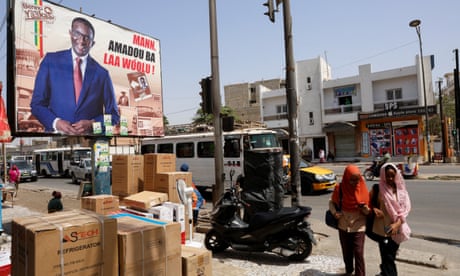Senegal’s anti-establishment candidate looks almost certain to become president after a stunning election victory that is likely to steer the west African country in a radical new direction.
A little over a week after his release from prison, Bassirou Diomaye Faye is almost certain to be declared the country’s next president after his main rival unexpectedly called him on Monday to concede defeat.
Most analysts had expected the election to go to a tightly contested second round runoff between Faye and Amadou Ba, who represented the ruling administration.
The fact that Faye appears to have secured more than 50% of the vote despite 18 other candidates underlines the desire among Senegalese for the profoundly different political direction that he represents.
It is also a damning rejection of Macky Sall, the incumbent president who has been in power for 12 years yet leaves office with his country facing widespread poverty and almost a third of Senegal’s youth unemployed.
After Sunday’s peaceful vote, Monday began with Ba in fighting form, insisting that he still expected a runoff vote against Faye to decide the victor.
However by mid-afternoon, and with a lengthening number of other candidates congratulating Faye as the winner, Ba abruptly conceded defeat – despite the full provisional results of the vote not expected until Friday.
In a statement, Ba said: “In light of presidential election result trends and while we await the official proclamation, I congratulate … Faye for his victory in the first round.”
His withdrawal prompted immediate, widespread celebrations among Faye’s supporters in the capital, Dakar.
More widely, a peaceful transition of power in Senegal represents a result for democracy in west Africa, a region where there have been eight military coups since 2020.
Even so, Senegal’s election almost didn’t happenafter Sall abruptly called it off last month, only to backtrack when faced with huge opposition.

The triumph for Faye is likely to precipitate significant change in Senegal, including a profound redrawing of its relationship with its former colonial power, France.
Promising a presidential programme of leftwing pan-Africanism, Faye wants Senegal to cease using the CFA franc – the west African single currency pegged to the euro with the financial backing of the French Treasury – which critics deride as a relic of colonialism.
The 44-year-old, who would be Senegal’s youngest president, has also promised to renegotiate huge mining, gas and oil contracts signed with foreign companies. Senegal is due to start hydrocarbon production this year, a development that has brought hopes of future – and much needed – wealth for the country.
Investors, meanwhile, are wary about a change to an anti-establishment government that may not pursue the same business-friendly policies seen under Sall’s government that have attracted investments into infrastructure.
Yet Sall’s policies – represented directly by Ba in the election – failed to ease economic hardship in one of west Africa’s more stable democracies.
The UN world food programme says 39% of Senegalese people live in poverty.
Much of the credit for Faye’s victory will go to Ousmane Sonko, the leader of the Pastef party in which Faye in a senior official.
The two former tax inspectors have campaigned together under the slogan “Diomaye is Sonko”, promising to fight corruption, spread wealth more equally and prioritise national economic interests.
Faye, along with Sonko, was released from prison 10 days before the election under a rapidly passed amnesty law.
Sonko, who was disqualified from the vote because of what he claims are politically motivated charges, has a large following among Senegal’s vast youth population.
More than half of the country’s population is under the age of 25, with many sharing concerns about unemployment and poverty.









































